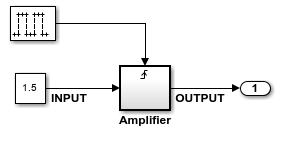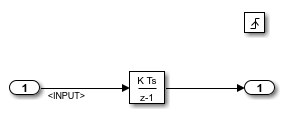Generate Code for Elapsed Time Counter
This example shows a model from which you can generate code for an elapsed time counter. The code generator allocates and maintains an elapsed time counter for a triggered subsystem or unconditionally executed subsystem within a triggered subsystem that contains a block that depends on elapsed time. An example of a block that requires elapsed time is the Discrete-Time Integrator block.
Open Example Model
Open the example model ElapsedTimeCounter. The model includes a triggered subsystem, Amplifier. The model is configured to use a data code interface.
open_system("ElapsedTimeCounter.slx");
Open the Amplifier subsystem. The subsystem includes a Discrete-Time Integrator block, which uses elapsed time.

Generate and Inspect Code
Generate code for the model.
Declarations for Fixed-Step Size Timer
In header file ElapsedTimeCounter.h, within the real-time model data structure tag_RTM_ElapsedTimeCounter_T, the code generator allocates storage for timer information in a substructure. Within that substructure, the code generator uses 64 bits (fields clockTick0 and ClockTickH0) to store and update the time counter for the model fixed-step size (fundamental sample time).
struct tag_RTM_ElapsedTimeCounter_T {
const char_T *errorStatus;
RTWLogInfo *rtwLogInfo;
struct {
time_T taskTime0;
uint32_T clockTick0;
uint32_T clockTickH0;
time_T stepSize0;
time_T tFinal;
boolean_T stopRequestedFlag;
} Timing;
};
Declarations for Elapsed and Previous Time Data
Header file ElapsedTimeCounter.h also declares variables for elapsed and previous time data. For subsystem Amplifier, the code generator allocates storage for the elapsed time and previous time values (fields Amplifier_ELAPS_T[2] and AMPLIFIER_PREV_T[2]) in the model block state structure DW_ElapsedTimeCounter_T.
typedef struct {
real_T DiscreteTimeIntegrator_DSTATE;/* '<S1>/Discrete-Time Integrator' */
int32_T clockTickCounter; /* '<Root>/Pulse Generator' */
uint32_T Amplifier_ELAPS_T[2]; /* '<Root>/Amplifier' */
uint32_T Amplifier_PREV_T[2]; /* '<Root>/Amplifier' */
} DW_ElapsedTimeCounter_T;
Elapsed-Time Computation
In file ElapasedTimeCounter.c, entry-point function ElapasedTimeCounter_step contains the code that computes the elapsed time. The function maintains the elapsed time as a state of the triggered subsystem.
void ElapsedTimeCounter_step(void)
{
.
.
.
zcEvent = rt_ZCFcn(RISING_ZERO_CROSSING,
&ElapsedTimeCounter_PrevZCX.Amplifier_Trig_ZCE,
((real_T)rtb_PulseGenerator));
if (zcEvent != NO_ZCEVENT) {
Amplifier_ELAPS_T_tmp_tmp = ElapsedTimeCounter_M->Timing.clockTick0;
ElapsedTimeCounter_DW.Amplifier_ELAPS_T[0] = Amplifier_ELAPS_T_tmp_tmp -
ElapsedTimeCounter_DW.Amplifier_PREV_T[0];
elapseT_H_tmp = ElapsedTimeCounter_M->Timing.clockTickH0;
elapseT_H = elapseT_H_tmp - ElapsedTimeCounter_DW.Amplifier_PREV_T[1];
if (ElapsedTimeCounter_DW.Amplifier_PREV_T[0] > Amplifier_ELAPS_T_tmp_tmp) {
elapseT_H--;
}
ElapsedTimeCounter_DW.Amplifier_ELAPS_T[1] = elapseT_H;
ElapsedTimeCounter_DW.Amplifier_PREV_T[0] = Amplifier_ELAPS_T_tmp_tmp;
ElapsedTimeCounter_DW.Amplifier_PREV_T[1] = elapseT_H_tmp;
.
.
.
Discrete-Time Integrator Use of Elapsed Time
After entry-point function ElapasedTimeCounter_step computes the elapsed time, the function uses the computed value to perform the output and update computations for the Discrete-Time Integrator block.
.
.
.
OUTPUT = ElapsedTimeCounter_DW.DiscreteTimeIntegrator_DSTATE;
ElapsedTimeCounter_DW.DiscreteTimeIntegrator_DSTATE += 0.3 * (real_T)
ElapsedTimeCounter_DW.Amplifier_ELAPS_T[0] * 1.5;
}
.
.
.